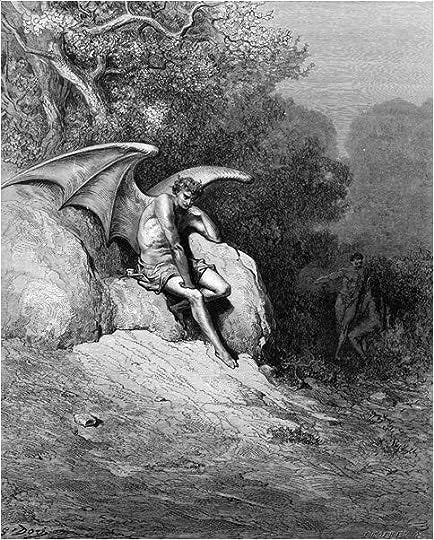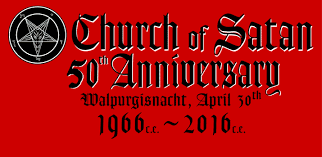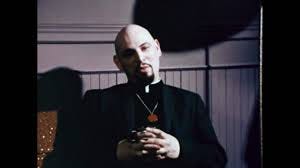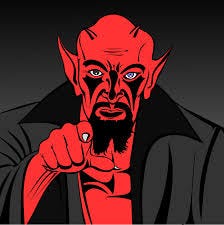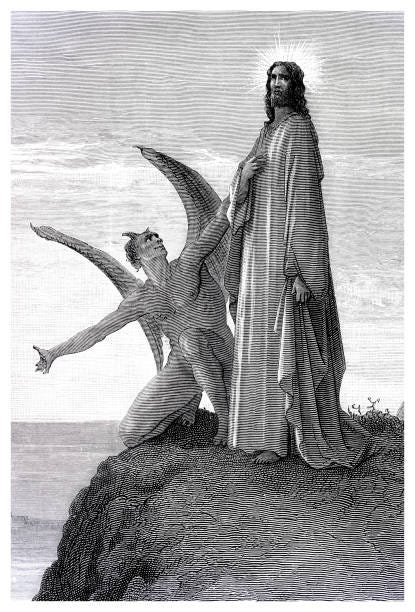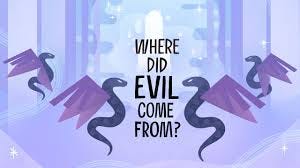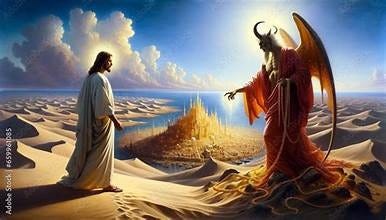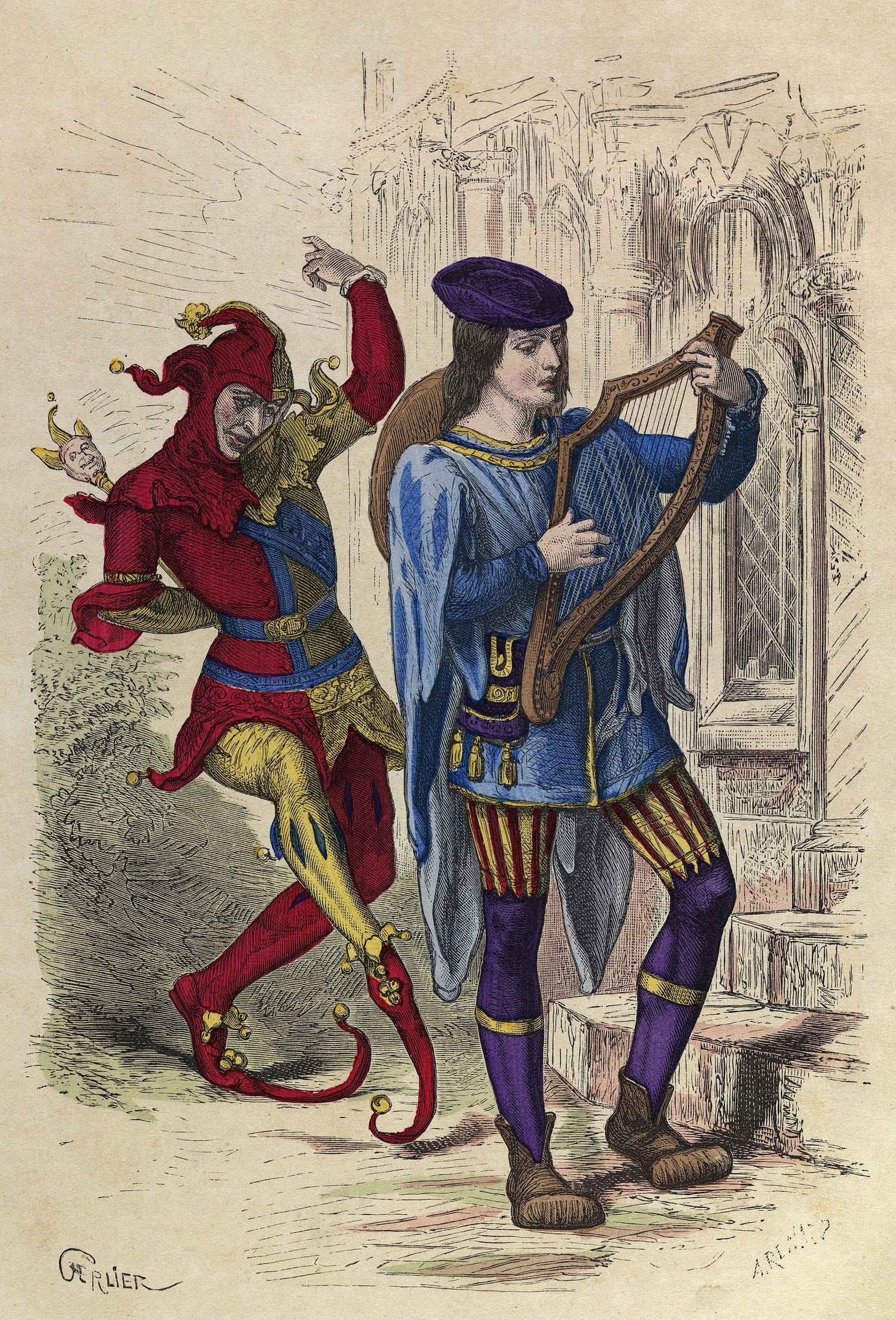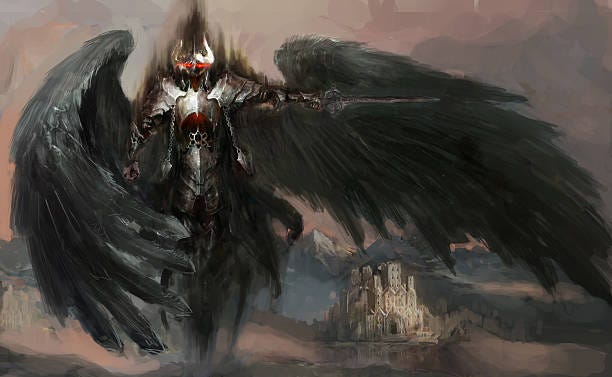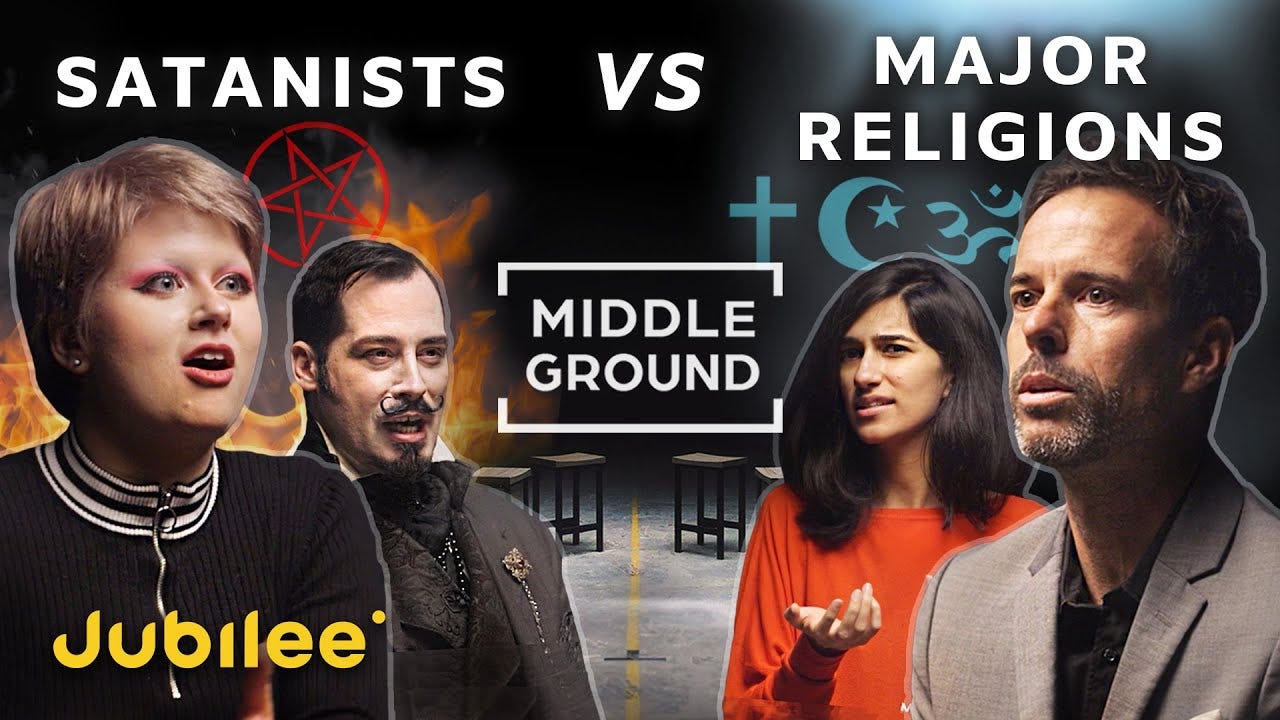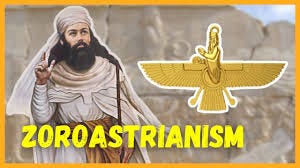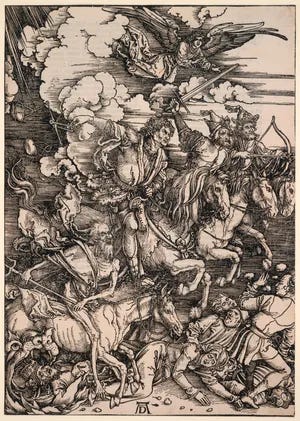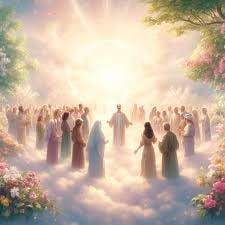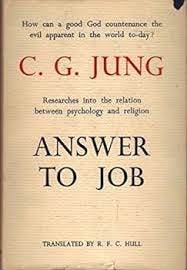The Devil Made Me Do It!
Satan: A Psychological Profile
This entry was prompted by an article I read in the New Yorker: “Sure “Paradise Lost” is radical, but did you know it was sexy? by Merve Emre, December 16, 2024.
What does Satan mean (to me)?
A wider POV:
Why does Satan (or the Devil) exist?
What ideas come from Beelzebub?
What can Lucifer teach us about ourselves?
The Devil (Beelzebub, Lucifer, or Satan).
The array of people who follow (or worship), fear, sympathize, or disdain Satan is endless.
Did “Evil” come from Satan?
Did Satan leverage evil for his purposes?
Where did Satan come from?
The Church of Satan indeed exists (and thrives) in modern America.
Its mission is the abject denial of supernatural ideas like magic, spells, or witchcraft, including beliefs in God or other superordinate beings (like extraterrestrial aliens).
Its founder (first High Priest), Anton Szandor LaVey (1930-1997), promoted “humanistic values” and “rationalist philosophy” through the Church of Satan.
LaVey professed that “Satanists
“…find their path to self-deification by rejecting the “herd mentality” as blind faith conformity to spurious beliefs along with unilateral adherence to non-verifiable ideologies (such as a monotheistic God in Heaven).”
The Church of Satan’s mission is to elucidate (through a series of affirmative statements) the embodiment of Satan and Satanism:
Satan represents indulgence instead of abstinence!
Satan represents vital existence instead of spiritual pipe dreams!
Satan represents undefiled wisdom instead of hypocritical self-deceit!
Satan represents kindness to those who deserve it instead of love wasted on ingrates!
Satan represents vengeance instead of turning the other cheek!
…
The Church of Satan “opposes” organized religion, particularly Judeo-Christian traditions, even though The Church of Satan is, itself, an organized religion or religious entity with a leader, a following, and a headquarters (or a Church).
Be that as it may…
Everyone in America knows something about Satan (or the Devil), and this is through Satan’s juxtaposition to the God of the Old and the New Testaments.
Nowhere in the Bible (or related texts) do I read that Satan is on the same existential plane as God (or Yaweh), even though some writings portray the two in frequent conversations over what is good (or bad) for humanity.
Satan is mentioned over 55 times in the Bible. In most of these entries, Satan is referred to as "the devil" or "diabolos" (in the Greek text).
Why such interest?
For one, the Biblical story of Adam and Eve would not be complete or as compelling without the Devil, who appears to Eve as a Serpent.
Satan seduces Eve to eat the fruit of “the knowledge of good and evil” (colloquially an apple), resulting in the couple’s expulsion from the Garden of Eden.
I can’t help but associate Eve with Snow White, who, like Eve, succumbed to the same fruit.
Apples should be maligned, but the apple managed to weather its darker history and found redemption in health prevention (or keeping the doctor at bay).
Satan is tightly linked to the concept of “evil,” which I discuss elsewhere.
Judaism portrays Satan as an agent, typically a metaphor for the yetzer hara, or an evil inclination.’
Is Satan truly the evil character he’s made out to be?
Or, could it be that Satan is a misguided, superordinate creature who discovered (and used) evil for his purposes, but still has some guilt and possibility of forgiveness (and redemption) in the eternities.
This is a tricky question because what we know of Satan’s life and times is spotty.
I borrow from multiple source documents:
The Bible
Milton’s Paradise Lost
Recent New Yorker Article, “Sure “Paradise Lost” is radical, but did you know it was sexy? by Merve Emre, December 16, 2024.
Carl Jung’s Essay: “Answer to Job”
The Origin of Satan by Elaine Pagels, Knopf Doubleday, 1996
The Stanford Encyclopedia of Philosophy
I begin with lines from Satan in Paradise Lost:
These are spoken by Satan while Satan is in “Hell:”
“The mind is its own place, and in itself
Can make a heav’n of hell, a hell of heav’n.
What matter where, if I be still the same,
And what I should be, all but less than he
Whom thunder hath made greater? Here at least
We shall be free: th’Almighty hath not built
Here for his envy, will not drive us hence:
Here [in Hell] we may reign secure, and in my choice
To reign is worth ambition, though in hell;
Better to reign in hell than serve in heav’n.”
Paradise Lost, Book One, lines 254-263
This poetry has much to offer in understanding ourselves and our life situations.
Satan, in this story, is the ultimate “adapter” and “re-framer” of reality, a master of Cognitive Behavioral Therapy.
“The mind is its own place, and in itself, [so I] Can make a heav’n of hell, a hell of heav’n.
Here at least [on the positive side of things] We shall be free: th’Almighty hath not built
To reign is worth ambition, though in hell; [therefore] Better to reign in hell than serve in heav’n.”
I finished Paradise Lost a few weeks ago. It reminded me of how a supreme adversary can rally “the” troops to fight “once again” under the Commander’s steady hand.
Paradise Lost was written at a unique time in World History when Milton, blind from birth, was struggling (as a Puritan and republican) against the Anglican Church and utilizing the epic of Homer’s Odyssey and Virgil’s “Aeneid” to create a superstructure story revolving around the juxtaposition of God and Satan in the fight for the soul of humanity.
Wow!
A literary work of genius (beyond itself) inspired by difficult times.
My goal in this entry is threefold:
Who is Satan?
Why is Good versus Evil personified in God versus Satan?
Is there an intrapsychic need for Satanic influence?
Who is Satan?
A lay definition of Satan:
Merriam-Webster defines “Satan” as: 1a:…: the personal supreme spirit of evil often represented in Christian belief as the tempter of humankind, the leader of all apostate angels, and the ruler of hell… frequently used as an interjection, an intensive, or a generalized term of abuse…2a": …an evil spirit [the Devil made me do it]…3a: …: an extremely wicked person…4a: …: a person of notable energy, recklessness, and dashing spirit…5a: …usually used in the phrases poor devil, lucky devil…6a…something very trying or provoking, b: severe criticism or rebuke…, 5c: the difficult, deceptive, or problematic part of something (the devil in the details)…
This definition—one of the more extensive I’ve come across in Merriam-Webster—suggests the idea of Satan (or the Devil) is multifaceted.
Most of Satan’s sub-definitions deal with evil or specific troubling features of circumstances or persons that we have labeled as evil.
The American Psychological Association Dictionary does NOT define “Satan” per se, but it does refer to the term “Satanism.”
n. a religion based on the worship of Satan, the supreme personification of evil in Christian tradition, whether as a deity or a concept. Satanist cults vary from neopagan groups that revere Satan as a benevolent force of energy in nature to those that pay allegiance to Satan as an evil principle… In the latter case, worship takes the form of magical rituals that may involve an element of deliberate transgression (e.g., by parodies of Christian ceremonies or taboo sexual practices). Satanic ritual abuse (SRA) is the alleged psychological, sexual, or physical abuse of humans or animals committed as part of a religious ritual involving worship of Satan…
By my reading, the APA definition states the “opposite” of what the “Church of Satan” officially claims to stand for!
I wonder why the American Psychological Association chose to give Satanism such an “evil” and “negatively deviant” valence. I conjecture there are political reasons.
The Merriam-Webster definition of Satan, in my view, is better (or more balanced) than APA’s definition.
In this entry, I focus on “Satan (or Satanism) as …a diverse set of religious, philosophical, and countercultural beliefs and practices that are based on Satan.
Satanism is not a single or one-of-a-kind historical ideology but rather an evolving milieu of ideas drawn from a variety of sources with different POVs.
It is similar to other major religious traditions, such as Christianity, Islam, and Buddhism, which have evolved across time and cultures.
The goal of all religious traditions (including Satanism) seems to be to improve human well-being through the deification and worship—in thought and behavior—of a superordinate “OTHER.”
Satan, as a historical figure, has a long pedigree.
Divine by pedigree (ANGELIC), evil by action and belief.
In her definitive text, The Origin of Satan by Elaine Pagels, Knopf Doubleday, 1996, Pagels notes that in its initial use, the name Satan was attached to a neutral character with little influence or power, similar to a Jester in a King’s Court.
It was only with the advent of Judeo-Christian traditions that the concept of Satan was elevated to a “dark knight” of evil or a “fallen angel” of God and God’s works.
A personage who was in God’s “inner circle,” so to speak, and fell from grace.
One might wonder if God is really omniscient, prescient, and omnipotent, then why wasn’t He privy to Satan’s alternate views and Satan’s antipathy towards Him? Perhaps, as most Judeo Biblical scholars write, Satan was a part of the ultimate, pre-ordained eternal test or plan for humanity. How can one embrace good if there is no evil (or opposite) option to embrace?
In my view, every epic story needs an “evil-doer,” (or a foil) and Satan, the fallen angel of darkness from God, is about as evil as one can get.
Furthermore, Satan is frequently clever; apparently outwitting even God at times, and is occasionally employed by God (as His foil), for example, in Job, to tempt (or seduce) a human being to Satan’s way of thinking and behaving.
Although God has all-powerful properties, it also could be that God suspends these for a time to deal with humankind, similar to how one might approach a child while playing a game so that the game is competitive with the child even though the adult could easily win using the adult’s advanced knowledge.
Either way, Satan has been anthropomorphized as embodying a contrasting ideology to Christian rules of behavior. These are the rules used to keep its followers “in line.”
Christianity is highly effective at “keeping its followers obedient. They obey its particular tenants and support its human leaders because it uses harsh consequences for those who stray (e.g., Satan and Hell).
You need an “(d)evil doer” if you want people to embrace Christianity’s dogma of “good” and “righteousness” (according to how “Christianity defines good,” which is conditional in most cases). As noted in Ephesians below:
“Put on the whole armor of God, that you may be able to stand against the schemes of the devil. For we do not wrestle against flesh and blood, but against the rulers, against the authorities, against the cosmic powers over this present darkness, against the spiritual forces of evil in the heavenly places. Therefore take up the whole armor of God, that you may be able to withstand in the evil day, and having done all, to stand firm” (Ephesians 6:11-13)
Ephesians harkens back to the pivotal story of Job.
The story of Job is a window into Satan’s influence. The story begins with the introduction of Job, a blameless and upright man who fears God and shuns evil (Job 1:8). God declares in conversation with Satan,
“Have you considered My servant Job, that there is none like him on the earth?”
The Book of Job (c. 600 BCE) is the earliest text to address the problem of theodicy [The vindication of divine goodness and providence given evil.], which is a modern term for the problem:
"If God is so good, why does he permit evil and suffering to exist?"
The Book of Job opens with the angels reporting to God a startling fact.
Among them is the angel Satan, whose function is to travel the world, placing 'obstacles' in front of humans and requiring them to choose (good or evil).
Satan, at times, acts as God’s prosecuting attorney. God consents to this role for Satan. God mentions to Satan His favored human, Job.
Satan claims that Job has prospered not because Job is inherently good but because God grants Job so much favor in life and living.
Satan says to God (Yahweh):
“Doth Job fear God for nought? Hast not thou made an hedge about him, and about his house, and about all that he hath on every side? thou hast blessed the work of his hands, and his substance is increased in the land." (Job 1:10)
It is in this statement that Satan argues regarding the “hedge” that if God were to take away Job's wealth and prosperity, Job would then turn against God and curse him.
This “hedge” is the basis for the "test" that God allows Satan to inflict upon Job, where Job loses all his possessions, children, and health.
As used in the “Book of Job,” Satan is the English transliteration of an early Hebrew word for “adversary.”
With the definite article, the Hebrew word denotes “the adversary” par excellence. This use of Satan appears only in the Book of Job, where the adversary comes to the heavenly court.
God, in concept, assigns Satan the task of roaming the earth (metaphorically: “like a contemporaneous Persian official”), seeking out acts or persons to be reported adversely (to the king - or, in this case, God);
The quote in Job is as follows (Job 1:7) where Satan is reporting to God
God says: “Where have you come from?” Satan answers: ,“From roaming throughout the earth, going back and forth on it”.
Satan’s function is the pure opposite of that of the “eyes of the Lord,” to “roam the earth strengthening all that is good.”
Satan, of course, is cynical about disinterested human goodness, so Satan is permitted to test Satan’s assumption of complicit “Good” under God’s authority and control and within limits that God sets (for example, Satan cannot kill Job).
In Judaism, it is sometimes understood that, as an adversary, Satan acts as a divine prosecutor for God; in this role, God and Satan are not viewed as antithetical but cooperative.
This is one reason Satan is very “complex” because it appears even God did not always view Satan as a mortal enemy who would do anything to harm God, but rather as a being (or angel) that holds different - albeit less preferred - values to God. God appears in the case of Job to work with Satan to achieve God’s overall purposes.
Juxtaposing Good Versus Evil
When Satan first appears in Genesis, he is an evil angel. I note this because the prophet Isaiah suggests Satan was not always evil.
According to Isaiah, Satan and other angels in heaven were initially created holy (this makes sense for the meaning and purpose of angels). The angels’ home is heaven.
However, sometime after Satan’s creation, Satan sinned (which suggests angels do have free agency). The basis of this sin was Satan’s abject desire for power in that Satan wanted to be “omnipotent” like God.
How you have fallen from heaven,
O star of the morning, son of the dawn!
You have been cut down to the earth,
You who have weakened the nations!
But you said in your heart,
“I will ascend to heaven;
I will raise my throne above the stars of God,
And I will sit on the mount of assembly
In the recesses of the north.
I will ascend above the heights of the clouds;
I will make myself like the Most High.”
Nevertheless, you will be thrust down to Sheol, [name given to the underworld or afterlife where only the “dead” reside],
To the recesses of the pit. Isaiah 14:12-15, KJV
(NOTE: This passage sounds as if it’s from the Netflix drama: “Game of Thrones.”
There you have it.
Satan was a Holy Angel
Satan either lost (or never had) reverence for God.
Satan wanted the same power as God.
God became aware of Satan’s selfish desire and cast Satan to Hell (or Sheol).
How Satan got to earth is unknown, but Satan roams the earth acting quasi-independently and, at times, even a foil for God or as an integral part of God’s plan.
Satan rarely fully succeeds in seducing “Main” scriptural characters (Adam, Eve, Job, Jesus, etc.). Still, the claim is Satan can succeed ultimately with ordinary people (think of Faustus in Mephistopheles by Goethe), so beware and “do what is right,” or so Christians believe (don’t sin), or you will go to Hell and be enslaved there.
NOTE: Satan has an even earlier entry point in world mythology through Zoroastrianism, an ancient Iranian religion that predates the Biblical Satan by eons.
In Zoroastrianism, Satan is a destructive spirit who struggles with God and the forces of goodness and light.
Satan is not an angel per se., but a “totally evil being.” It is highly likely that the Satan persona was adopted by the Jews living under Persian rule at the time and ultimately influenced those historians charged with the original writing of the Hebrew Bible.
To Zoroastrians, reality is shaped by dueling forces of light and dark, and every human being is free to choose a path. The " Zoroastrian Creed " [creed because Zoroastrianism was a “State” religion] was, according to Persian Law at the time, the most righteous path."
It goes like this: "On three noble ideals be ever intent: The good word well thought. The good word well spoken. The good deed well done."
Satan’s Role
Satan’s role was expanded and clarified in the New Testament, and from the Book of Job, Satan was in “The Accuser” position. This is in the writing of the Hebrew Bible.
This role for Satan (arch enemy) in the New Testament makes sense since the Jews at that time were the brunt of continual accusations. The “Accuser” title eventually migrated to the role of “commander of the armies of darkness” as Satan is portrayed in the Dead Sea Scrolls (and consistent with the Zoroastrian Creed).
The New Testament has given many lofty (but negative) titles to Satan:
“the ruler of this world” (John 12:31),
“father of lies” (John 8:44),
“god of this world” (2 Corinthians 4:4),
“ruler of the power of the air” (Ephesians 2:2)
Beelzebul, “ruler of the demons” (Matthew 10:25)
In the New Testament, Satan’s “kingdom” (or Hell) is never portrayed as harshly as the “born again bible-belt Christian Traditions” portray it today (thank goodness), as a burning underworld entirely of the tormented dead.
Instead, the image of Satan’s Hell is a permanent bondage state due to “sin and curses” where individuals are completely without AUTONMY or slaves to Satan and Satan’s hierarchy. This is parallel to how Christians view sin (as chains of bondage; you are only free when you are without sin, sin is disobedience to Christian dictates).
Unfortunately, “freedom” is only possible without sin. If sin is defined by total acceptance of Judeo-Christian tenets (including what “sin” is), then Christians’ actions are controlled by whether they have “sinned” or “not sinned.” This means followers are once again in a state of NO AUTONOMY (OR CHRISTIAN BONDAGE).
According to the transcribed words of Jesus (Matthew 12:29; Mark 3:27; Luke 11:21-22), Satan is more or less a “strong man” who rules over Satan’s desired treasures (humans).
"But no one can enter a strong man's house and plunder his goods, unless he first binds the strong man. Then indeed he may plunder his house." Mark 3:27
In this verse (which is confusing), the strong man is Beelzebul, and the attacker represents Jesus. Jesus was not violent by nature (no need, ostensibly because Jesus was God). Be that as it may, Jesus used a lot of violence in his metaphors.
Humans in Hell are Satan’s Slaves who have lost all autonomy or “Free Will.” Other references to Satan in The Book of Revelation are mostly of Satan robbing human beings of their AUTONOMY or their spiritual freedom.
"He causes all, both small and great, rich and poor, free and slave, to receive a mark on their right hand or on their foreheads.” (Revelations 13:16, and many more verses like this one).
This is not a good omen for the future, given that Elon Musk regularly wears his 666 ring on his right hand. Recall earlier picture.
Do We Need Satan?
The answer to this question is A QUALIFIED “YES”.
I’m qualifying my “YES” because Satan is so tightly connected to “Good versus Evil” that it would be difficult to use this concept without invoking “Satanic Ideology.”
Even so, creating an entirely Good world with no evil involved is technically possible.
I suppose this would be, for some people, Heaven!
When people think about Heaven, it seems like a wonderful but BORING place.
There are additional reasons that necessitate Satan. These are linked to several questions:
Who is God?
What is God’s purpose for us?
Why is God doing what He is doing?
Assuming that God actually “has” a purpose for us and that we can figure out that purpose, I preface the next section with a caveat:
YOU CAN STOP READING HERE BECAUSE WHAT FOLLOWS ARE
“my own” ideas
To appreciate and understand Satan is to understand God. For the most part, my POV is that:
GOD IS US.
According to the Bible and other scriptural writings,
God created “man” in God’s image.
God sent His son to earth to engage a God-to-Man-to-Man/God process.
God’s son, or Jesus, is humankind’s supposed role model; if so, we likely follow the same process or function as Jesus through some part of the God-to-Man-to-Man/God process.
Jesus’ birth was through “immaculate” conception, so this does put Jesus apart from a typical man (like Job). But, this did allow Jesus to obtain a body, which also meant Jesus was privy to the unconscious but could likely suspend the unconscious if needed (whereas the ordinary person (man, woman, Creature) can’t do this.
Carl Jung (Psychiatrist and Psychoanalyst) spent a lifetime studying humanity’s great myths and traditions.
Jung was interested in the Biblical dynamic of the God-to-Man-to-Man/God process (portrayed in the Book of Job). Jung wrote an entire book on the topic. Note: It is a very readable book, I have studied it carefully from beginning to end.
This dynamic God-to-Man-to-Man/God process is not unique to the Bible. It is repeated in myths throughout history (For example, in the Egyptian Myth, the sun god Ra created the first gods, Shu and Tefnut, who then created humans from tears of happiness).
The Biblical version is a clarified/recent rendition of this dynamic.
Jung was fascinated with the Book of Job. Why?
It provides information about God’s intra-psychic nature and how God approaches the development of the human individual (which Jung labels the “Creature”).
I provide a lengthy quote from Carl Jung, Answer to Job, page 567. This is the only quote I include because, in spite of the text being clear, it is dense in information for the uninitiated reader. This quote underscores Jung’s view of the duality (moral, personal, and ethical) of the superodinate entity God (or Yaweh).
…These words clearly show that Job,… [despite] his doubt as to whether man can be “just” before God, still finds it difficult to relinquish the idea of meeting God on the basis of justice and therefore of morality. Because, in spite of everything, he [Job] cannot give up his faith in divine justice, it is not easy for [Job]to accept the knowledge that divine arbitrariness breaks the law. On the other hand, [Job] has to admit that no one except Yahweh himself is doing him injustice and violence. He [Job] cannot deny that he is up against a God who does not care a rap for any moral opinion and does not recognize any form of ethics as binding. This is perhaps the greatest thing about Job, that, faced with this difficulty, he does not doubt the unity of God. He clearly sees that God is at odds with himself—…that he, Job, is quite certain of finding in God a helper and an “advocate” against God. As certain as he is of the evil in Yahweh, he is equally certain of the good. In a human being who renders us evil we cannot expect at the same time to find a helper. But Yahweh is not a human being: he is both a persecutor and a helper in one, and the one aspect is as real as the other. Yahweh is not split but is an antinomy—a totality of inner opposites—and this is the indispensable condition for his tremendous dynamism, his omniscience and omnipotence. Because of this knowledge Job holds on to his intention of “defending his ways to his face,” i.e., of making his point of view clear to him, since notwithstanding his wrath, Yahweh (God) is also man’s advocate against himself [God] when man puts forth his complaint…”
God created the “Creature,” and the “Creature” ultimately had experiences that God had not experienced.
God was jealous of HIS “Creature,” Job, and because of this, God understood that HE must give human beings the full measure of their “Creaturely” potential. Therefore, according to the Book of Job, God was obligated to take steps to fulfill human creatureliness in God’s personage.
But first, God had to test the best prototype Creature in existence at the time.
Unfortunately, the testing goes awry, as Jung conjectures in the quote below:
…Job’s undeserved suffering-something to which Yahweh, even if he had only a faint inkling of it, could hardly remain indifferent. Without Yahweh’s knowledge and contrary to his intentions, the tormented though guiltless Job had secretly been lifted up to a superior knowledge of God which God himself did NOT possess…
This issue harkens back to Able (Able was another of God’s prototype Creatures, and Able was on the right course but was, unfortunately, killed by Cain, which is why God was so angry with Cain and the intensity of Cain’s unanticipated jealousy towards Able.
Note: God had given His creatures free agency, so even God was surprised when this murder occurred, at least according to the story itself. Why Cain wasn’t cognizant that God would immediately discover his murder of Abel is perplexing, even to the writer of the Book of Job (who described - in the Book of Job - the murder of Abel by Cain as a backdrop to the story of Job).
What was it about Humans that God of the Book of Job or Yaweh was missing?
A PHYSICAL BODY
AN UNCONSCIOUS
Humans have an unconscious, but do not control it, even though it is an inherent part of each human being.
God—at least at the time of the Book of Job—did not have an unconscious because God controlled (and was aware) of all aspects of Himself. The unconscious is necessary for complete freedom, and God wanted this complete freedom for Himself. This was only possible if there was a part of Himself that HE (GOD) did not control (or was not aware of).
In a contemporary sense, as described by Hegel and Nietzsche, God is the Master (The Blonde Master Race—via Nietzche), and we, everyday people, are the slaves of the Master Race. The Master has no wants or needs; the Master just takes without thinking. The Master is aware of everything; therefore, he does not need a part of himself he is unaware of, so the Master has no unconscious, per se.
Unlike the Master Race, the Slave Race (or most humans) developed an unconscious (which evolved to protect aspects of themselves from the Master Race. The Master could not control or take away the slave’s unconscious), and this, according to Nietzche, is where the Unconscious comes from (also where self-criticism and our intrapsychic world comes from).
This is also why humans are so easily tempted by sin (culturally generated wrongs):
The unconscious part of humans has no regard for sin. It only has respect for the welfare of the given human being who embodies the unconscious, and the unconscious is not beholden to culture in any way, shape, or form. It doesn’t transcend culture, it just functions independently of culture with the goal of adaptation.
GOD is the Master, so to speak. We are the Creature (his creation).
God probably doesn’t need an unconscious, but his creatures need it. So, GOD wants one, and God, or as the story of Job goes, did not have one at the time of Job. God also wanted a Body. These issues are both explored in the Book of Job.
God wants the devil (Satan) to tempt Job, and if Job succumbs to the temptation, God will not have created a fully evolved Creature. I suppose if this happened, God would need to flood the world again and destroy everything, and, according to the Book of Job, God was not interested in doing that again (or starting from scratch).
Even so, God was sure Satan would not prevail, but God needed to test Job, and God did, indeed, test Job (through Satan)…And so the story goes. This is where God develops a plan to send a God-Man to earth (Jesus, God’s only son, and now “a quasi divine/human begotten son,” born of a virgin birth). Through this process, Jesus becomes a God-creature, and since God and Jesus are one, this serves the purpose of the body (for God) but not the unconscious. How God obtains an unconscious requires another entry.
There is much more to the Story of Job as it relates to the human unconscious and intra-psychic processes that impact us today, which I can present in another entry, depending on how many people read this test entry.



